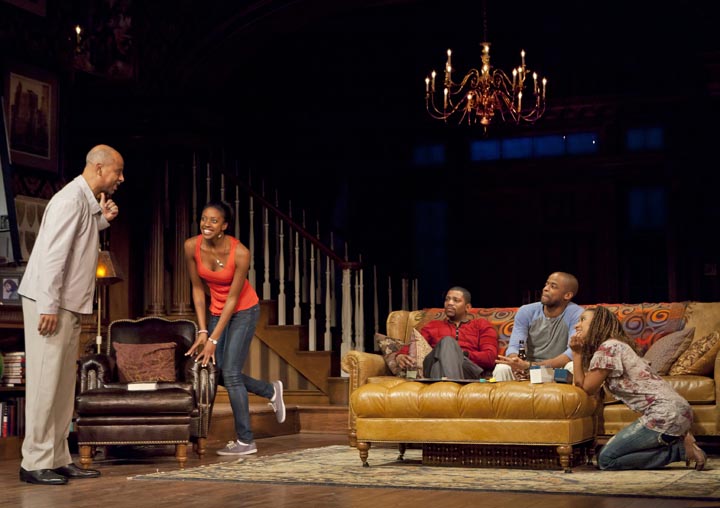For most playwrights, the prospect of a Broadway production shines like a glittering jewel at the end of a tunnel. It’s understandable that those who get there pause to savor the acclaim. But these days, playwright and Vineyard visitor Lydia Diamond hasn’t had time to ponder the implications of being an African-American playwright opening her first Broadway show amidst a spectacular season for New York theatre.
In an interview in New York this week two days before the opening of Stick Fly, Ms. Diamond spoke instead about the writing and making of a play that she said simply began as a challenge to herself.
The play’s set-up will sound familiar: A family gathers at a long-held vacation home on Martha’s Vineyard. Stick Fly is a comedy about generational conflicts in a prominent and affluent African-American family, the LeVays. Their story also might sound familiar: The family lives in New York city where patriarch Joseph LeVay works as a neurosurgeon; his cultured wife is revered by their sons and New York society; sons Flip and Kent could not be more different — with Flip living comfortably as a plastic surgeon while younger brother Kent pursues a variety of paths, the latest being fiction writing. The family extends to longtime housekeeper, Miss Ellie, and her teenage daughter, Cheryl, who has arrived early to prepare the house for the LeVay’s treasured time on the Island. The play takes place over a weekend when both sons bring women home to meet the parents. In it, Ms. Diamond explores issues of class and race. Her bold reflections give voice to thoughts most people whisper but are afraid to say out loud. But for Ms. Diamond, Stick Fly is, above all, a story about family, love and relationships.
Helming the Broadway production is veteran director Kenny Leon. His recent successes include a previous production of Stick Fly as well as the Broadway revival of Lorraine Hansberry’s A Raisin in the Sun that featured Cosby mom Phylicia Rashad and the debut of Sean (Puffy) Combs. A lead producer on Stick Fly is singer/songwriter Alicia Keys, who fell in love with the play after being introduced to it by the director and whose support has been instrumental in bringing the play to Broadway. (Ms. Keys has also composed incidental music for the production.) The cast includes Dulé Hill (The West Wing), Ruben Santiago-Hudson (Castle), and Tracie Thoms (Rent).
But Broadway has never been the be-all, end-all for Ms. Diamond. Her 20-year long career has been one full of hard work – and has lately kept her traveling across the country and away from the Cambridge home she shares with her husband and son. She was raised by a single mother who was a musician and academic. After graduating from Northwestern University, she started a Chicago-based theatre company called Another Small Black Theatre Company with Good Things to Say and a Lot of Nerve Productions.
Despite being a voracious and extensive reader, she developed a writer’s voice free of the influences that saddled other playwrights. Her poetic, intellectually challenging plays caught the ear of many theatre professionals. A residency at Chicago Dramatists led to productions and commissions at two of America’s leading developers of new plays — the Goodman Theatre and Steppenwolf Theatre Company. Within a few years, Ms. Diamond’s work was being produced from coast to coast.
In 2003, while working on a play about the Venus Hottentot, Ms. Diamond thought she’d challenge herself to write a “well-made” play following traditional theatre structures. To do so, she explored a familiar theatrical set-up: a family gathering at a vacation home. She likens the scenario to being “held hostage” in a vacation home. She chose the Vineyard as a setting over runner-up choices (Sag Harbor, Hilton Head) because it’s an Island — one that keeps you trapped and that you very deliberately have to figure out how to get off. “I really thought that writing a well-made play would be easier,” she laughed. “They look easy when they’re done well. But it was harder for me. I found it really challenging in a good way. It ended up being exactly what I needed. It was fun to write and I laughed a lot when I was writing it.” That well-made play became Stick Fly. And the laughter Ms. Diamond felt while writing the play has now been shared with audiences across the country, who have embraced her “experiment” with writing a traditional play.
Much has changed since Ms. Diamond’s LeVay family took to the stage to air their views on racism, discrimination, pride, and class differences. The most significant change is that the White House is now occupied by an African-American family that vacations on the Vineyard. Yet the author stands firm in keeping the play’s setting as “Martha’s Vineyard, 2005, not Oak Bluffs.” For one thing, the play doesn’t take place in any one Vineyard town, much less Oak Bluffs. And the timing of the play is a sticking point for its author. “This is a pre-Obama administration play,” she declared. “It was important to me that it be a period piece now because there’s no way the characters’ conversations about race could have happened without some references to Obama.” Dialogue she wrote before the Obama administration has prescient resonance now. “I find it interesting when Kimber talks about not even being allowed to say that there’s racism anymore,” she said. “I wrote that pre-Obama but I think that’s true even more now. The country has been in a self-congratulatory mode around race, which makes it harder to talk about as something that we still need to work on.”
With Stick Fly, Ms. Diamond said she did not set out to write an “issue play.” Instead, she wanted to explore having an absent father, the friendships between black and white women, and the tensions around white women and black men. Ms. Diamond looked at the images that society values and, as she says, “ how we define ourselves based on how others define us.” She admits that she is still trying to understand and answer some of these questions for herself.
When she began writing her play, she had only heard about the Vineyard but had never been there. She chose the Island as the setting because she knew that for the characters, the Vineyard was the only place their home could be. She did her Island research from afar, but grasped for authenticity. She acknowledges the subconscious influence of legendary jazz age writer and longtime Oak Bluffs resident Dorothy West, and she read Jill Nelson’s Searching for Martha’s Vineyard. Since moving to Boston in 2004 when her husband took a job teaching at Harvard, Ms. Diamond and her family have become regular visitors at a Chilmark cottage owned by friends. “I would not characterize us as people who summer at the Vineyard; we’re people who go to the Vineyard sometimes in the summer. But now, loving the Vineyard, we would probably do it anyway,” she said. “We would go and pay the money and be in a hotel or a bed and breakfast for a week or so; we love it so much.” She finds reassurance that so many Vineyard people have been supportive of the play. But she is adamant that Stick Fly is not a play about Martha’s Vineyard and she didn’t base it on a particular family or people.
Lydia Diamond’s Vineyard visits seem miles away as rain and gray clouds beat down on New York city during the week of her Broadway opening. As Dec. 8 approached, she exhausted herself with a schedule full of performances and press interviews as well as thrills such as picking up her dress for opening night. She’s aware of the media focus, caused in part by the presence of a feat as-yet-unheard-of: the current run of three Broadway plays written by African-American female playwrights. (Katori Hall’s The Mountaintop plays at the Bernard Jacobs Theatre; Suzan-Lori Parks’ adaptation of the Gershwins’ Porgy and Bess begins previews on Dec. 17.) Ms. Diamond takes it in stride and isn’t ready to stop with this accomplishment. “I’ve been wanting to acknowledge the significance of the moment, but I’m hesitant to be over self-congratulatory,” she said. “It’s taken a little too long to embrace a different way of seeing African-Americans on stage.”
Most of all, she wants her audience members to have a satisfying evening of theatre. The smiles on the faces of folks exiting the Cort Theatre, coupled with the conversations taking place in theatre chatrooms and coffeeshops all over New York, indicate that Lydia Diamond has done just that.





Comments
Comment policy »